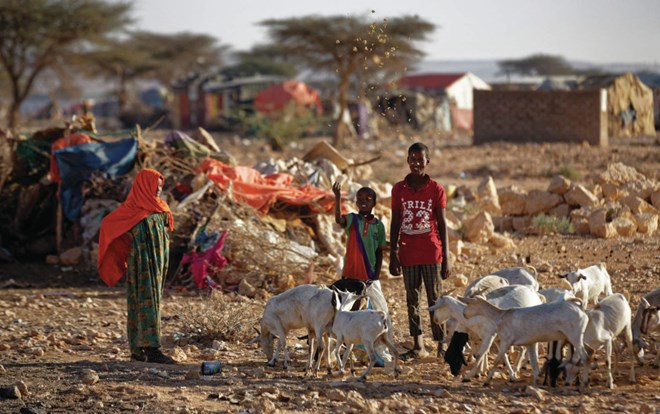
Friday September 24, 2021

In this photo taken Thursday, March 9, 2017, boys throw food to feed their goats in a camp for the displaced in Qardho in Somalia’s semiautonomous northeastern state of Puntland. Somalia has declared the drought a national disaster, part of what the United Nations calls the largest humanitarian crisis since the world body was founded in 1945, and with animals being central to many the drought threatens their main sources of nutrition and survival. (AP Photo/Ben Curtis)
(ERGO) – Abdiweli Hassan Mohamed, a pastoralist in Eyl in Somalia’s northeastern Nugal region, is relying on good neighbours sharing a little of their precious water to keep his herd of 35 goats alive during these tough times of drought.
The water sources are dry and the livestock have no pasture. He gets whatever his neighbours can spare when they buy water transported by tankers from Qundheed village, 75 kilometres away, at the inflated cost of six dollars a barrel.
“The vehicle transporting the goats to market needs money, so does the broker. Twenty five dollars will be gone before you even get back to the village,” he said.
Pastoralists here were already struggling to make a living since COVID19 disrupted their major export market to Middle Eastern countries. The recent failed rains have made things much worse.
Abdiweli told Radio Ergo in a phone interview that their crisis has been deepening since July, when the rain water catchments in his village dried up. The camel herders in the area have moved to Bari region in search of water, leaving only the goat herders behind
Abdiweli, a father of seven, said his goats were too weak to walk the long distance to Bari. His only hope is that the next seasonal rainfall starts on time.
“If we don’t get rain by the end of September, we can’t stay here. We will have to move with our children and the goats to a place where there is water,” he said.
Mohamed Ismael Nur, another goat herder in a rural area outside Dangorayo town, said the only water they can access is trucked in by commercial tankers from a well 170 kilometres away and sells at seven dollars a barrel.
“Most people can’t afford this expensive water. They depend on the few who can buy it. The neighbours are supporting each other,” he said.
Mohamed, a father of 10, said during previous dry seasons they would rely on money they had saved from exports and local sales of their goats during the Eid-Al-Adha festivities and the Haj pilgrimage. However, few goats were sold due to restrictions and financial hardships caused by COVID19.
“The main market for our livestock was the export market, which has been paralysed by COVID19. We used to buy water, pasture, food, and even clothes with the money we earned exporting our livestock. Now, we don’t even have money to buy water for our sick goats and family,” he said.
Mohamed called on the government, humanitarian agencies, and well-wishers to support the pastoralists and others living in the rural villages who are struggling during a biting drought.